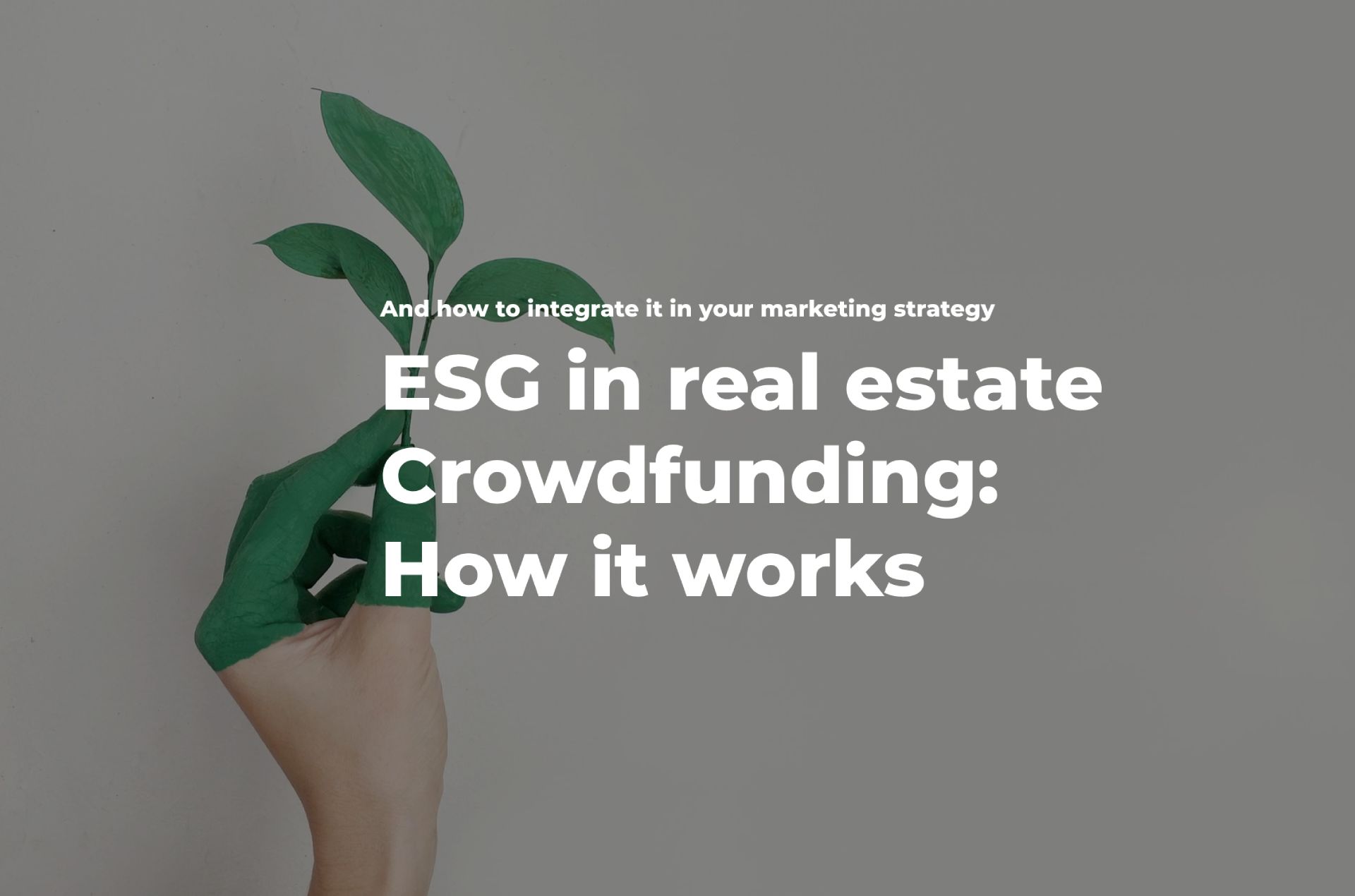What is Real Estate Crowdfunding?
Real estate crowdfunding is a modern investment method that enables multiple individuals to collectively fund property development or real estate projects by pooling their resources through online platforms. This innovative approach offers several potential benefits, making it an attractive investment opportunity for many. Firstly, real estate crowdfunding provides investors with the chance to diversify their portfolios beyond traditional asset classes, such as stocks and bonds. By investing in various real estate projects, investors can spread their risk and potentially increase their returns.
Secondly, real estate crowdfunding lowers the capital requirements for investors, as it allows them to invest smaller amounts compared to traditional real estate investing. This reduced entry barrier makes it possible for a wider range of investors to participate in the real estate market and benefit from its potential returns.
Lastly, real estate crowdfunding offers access to institutional-grade deals, which were previously available only to accredited or wealthy investors. By leveraging the power of the crowd, these platforms can negotiate better terms and offer exclusive investment opportunities to their users.
In summary, real estate crowdfunding is a promising investment method that combines the benefits of diversification, lower capital requirements, and access to institutional-grade deals. However, as with any investment, it is crucial to conduct thorough research and understand the associated risks and returns before diving in.
How Does Real Estate Crowdfunding Work?
Real estate crowdfunding is a process that enables multiple investors to collectively fund property development or real estate projects by pooling their resources through online platforms. To engage in real estate crowdfunding, potential investors should follow a series of steps to ensure they make informed decisions and maximize their potential returns. First, investors must select a reputable real estate crowdfunding platform that aligns with their investment goals and risk tolerance. Conducting thorough research on various platforms is crucial, as it helps investors identify the platform’s track record, investment offerings, fees, and regulatory compliance.
Once an investor has chosen a platform, they must create an account and complete any necessary accreditation or identity verification processes. These procedures are in place to protect investors and comply with regulatory requirements.
After setting up an account, investors can browse the available projects and assess their potential risks and returns. Real estate crowdfunding platforms offer various investment structures, including equity, debt, or hybrid deals. Each structure has its unique risk-reward profile, and understanding these differences is essential for making informed investment decisions.
Equity investments involve owning a share of the property or project, entitling the investor to a portion of the profits generated. These investments are typically higher risk, as they rely on the property’s successful sale or rental income. However, they also offer the potential for higher returns compared to debt investments.
Debt investments, on the other hand, involve lending money to a developer or property owner, who then repays the loan with interest. These investments are generally considered lower risk, as they provide a fixed income stream and a lower likelihood of loss compared to equity investments. However, the potential returns are also typically lower.
Hybrid deals combine elements of both equity and debt investments, offering a balance between risk and reward.
Before investing, it is essential to conduct thorough research on the project and its sponsor. Investors should consider factors such as the project’s location, market conditions, development team, and financial projections. By carefully evaluating these aspects, investors can make informed decisions and mitigate potential risks.
In summary, real estate crowdfunding is a structured process that involves selecting a platform, creating an account, evaluating investment opportunities, and conducting due diligence. By understanding the different investment structures and carefully assessing projects, investors can increase their chances of success in real estate crowdfunding, ultimately answering the question: is real estate crowdfunding a good investment?

The Appeal of Real Estate Crowdfunding
Real estate crowdfunding has gained significant traction in recent years, prompting many to ask, “is real estate crowdfunding a good investment?” The rising popularity of this investment method can be attributed to several factors that distinguish it from traditional real estate investing. First, real estate crowdfunding offers lower barriers to entry compared to traditional real estate investing. Traditionally, investing in real estate requires substantial capital, often beyond the reach of individual investors. Real estate crowdfunding platforms, however, enable investors to participate in property development or real estate projects with minimal capital requirements, making it an accessible investment option for a broader audience.
Second, real estate crowdfunding provides passive income opportunities for investors. In traditional real estate investing, property management can be time-consuming and labor-intensive. Real estate crowdfunding platforms, on the other hand, handle the day-to-day management tasks, allowing investors to earn passive income without the hassle of actively managing their investments.
Third, real estate crowdfunding enables investors to diversify their portfolios by investing in markets outside of their local area. Traditional real estate investing often limits investors to their immediate geographical region, exposing them to local market risks and limiting their exposure to various markets. Real estate crowdfunding platforms, however, provide access to projects in different markets, allowing investors to spread their risk and capital across various geographical locations.
Lastly, real estate crowdfunding offers access to institutional-grade deals that may not be available to individual investors. Real estate crowdfunding platforms often collaborate with experienced developers and property managers, providing investors with access to high-quality projects that may have otherwise been inaccessible due to their large scale or exclusive nature.
In summary, real estate crowdfunding has gained popularity due to its lower barriers to entry, passive income opportunities, geographical diversification, and access to institutional-grade deals. These advantages make real estate crowdfunding an attractive alternative to traditional real estate investing, further answering the question: is real estate crowdfunding a good investment?

Assessing the Risks of Real Estate Crowdfunding
While real estate crowdfunding offers numerous advantages, it is essential to consider the potential risks associated with this investment method. Understanding these risks is crucial to determining whether real estate crowdfunding is a good investment. First, illiquidity is a significant risk associated with real estate crowdfunding. Unlike publicly traded stocks or bonds, real estate crowdfunding investments are typically illiquid, meaning they cannot be easily sold or converted to cash. This lack of liquidity can make it challenging for investors to exit their investments, particularly in a downturn or market disruption.
Second, lack of transparency is another potential risk associated with real estate crowdfunding. While some platforms provide detailed information about their projects and investment structures, others may be less transparent, making it difficult for investors to make informed decisions. Investors should conduct thorough research on the platform and the projects before investing, seeking clarification on any issues or concerns.
Third, project failures can also pose a risk to real estate crowdfunding investors. Real estate development and investment projects can be complex and subject to various risks, such as market, regulatory, and operational risks. Investors should carefully evaluate the track record and experience of the project sponsors and developers, as well as the feasibility and potential risks of the projects themselves.
Despite these risks, investors can mitigate them through careful selection of platforms and projects, as well as proper diversification. Investing in multiple projects across various geographical locations and investment structures can help spread the risk and reduce the impact of any individual project failure or market disruption.
Moreover, investors should conduct thorough due diligence on the platforms and projects, seeking independent advice and analysis when necessary. Staying informed about regulatory changes and seeking professional advice can also help investors navigate the legal and regulatory landscape of real estate crowdfunding.
In summary, while real estate crowdfunding offers numerous advantages, it is not without risks. Illiquidity, lack of transparency, and project failures are potential risks associated with this investment method. However, investors can mitigate these risks through careful selection of platforms and projects, proper diversification, and thorough due diligence. Therefore, when considering the question, “is real estate crowdfunding a good investment?”, investors should weigh both the potential benefits and risks before making a decision.

Real-World Performance of Real Estate Crowdfunding
Real estate crowdfunding has emerged as a popular investment method in recent years, offering numerous potential benefits to investors. However, the question remains, “is real estate crowdfunding a good investment?” To answer this question, it is essential to review the historical performance of real estate crowdfunding platforms and projects. According to various studies and reports, real estate crowdfunding has delivered solid returns to investors in the past few years. For instance, a study by the Cambridge Center for Alternative Finance found that the median return on investment for real estate crowdfunding platforms in the United States was around 10% in 2020. Similarly, a report by Massolution estimated that the global real estate crowdfunding market would reach $8 billion in transaction volume by 2020, with an average annual return of 8.8%.
Moreover, several case studies and testimonials from successful investors highlight the potential of real estate crowdfunding as an investment method. For example, a real estate crowdfunding platform in the United States reported that one of its investors earned a return of over 20% on a single real estate project. Another investor in the United Kingdom reported earning a return of 15% on a real estate crowdfunding investment in a commercial property.
However, it is important to note that past performance is not a guarantee of future results, and real estate crowdfunding investments can be subject to various risks, such as illiquidity, lack of transparency, and project failures. Therefore, investors should conduct thorough research on the platform and the projects before investing and carefully evaluate the potential risks and returns.
In summary, the historical performance of real estate crowdfunding platforms and projects suggests that this investment method has the potential to deliver solid returns to investors. However, investors should approach real estate crowdfunding with caution and carefully evaluate the potential risks and returns before making a decision. Therefore, when considering the question, “is real estate crowdfunding a good investment?”, investors should weigh both the potential benefits and risks based on the available data and their investment goals.

How to Succeed in Real Estate Crowdfunding: Tips and Strategies
Real estate crowdfunding has emerged as a popular investment method in recent years, offering numerous potential benefits to investors. However, the question remains, “is real estate crowdfunding a good investment?” To maximize returns in real estate crowdfunding, investors should follow certain tips and strategies. Firstly, investors should set clear investment goals before diving into real estate crowdfunding. This includes determining their risk tolerance, investment horizon, and target returns. By setting specific goals, investors can make informed decisions about the types of projects and investment structures that align with their objectives.
Secondly, conducting thorough research on the platform and the projects is crucial before investing. Investors should evaluate the platform’s track record, transparency, and security measures. They should also assess the project’s location, developer’s reputation, and potential risks. By conducting due diligence, investors can make informed decisions and minimize potential losses.
Thirdly, diversification is key to success in real estate crowdfunding. Investors should spread their investments across various projects, locations, and investment structures to mitigate risks and maximize returns. By diversifying, investors can ensure that their portfolio is not overly exposed to any single project or market trend.
Fourthly, investors should monitor their portfolio regularly to track performance and adjust as necessary. Real estate crowdfunding investments can be subject to various risks, such as illiquidity, lack of transparency, and project failures. Therefore, investors should stay informed about regulatory changes, market trends, and project updates to make informed decisions.
Lastly, patience and long-term thinking are essential in real estate crowdfunding. Real estate investments can take time to yield returns, and investors should be prepared to hold their investments for several years. By adopting a long-term perspective, investors can ride out market fluctuations and maximize their returns.
In summary, real estate crowdfunding can be a profitable investment method when approached with caution and strategic planning. By setting clear investment goals, conducting thorough research, diversifying, monitoring their portfolio, and adopting a long-term perspective, investors can maximize their returns in real estate crowdfunding. Therefore, when considering the question, “is real estate crowdfunding a good investment?”, investors should approach it with a well-thought-out strategy and a long-term perspective.

Navigating the Regulatory Landscape of Real Estate Crowdfunding
Real estate crowdfunding operates in a complex regulatory environment, with different jurisdictions imposing varying rules and requirements. Understanding the legal and regulatory framework governing real estate crowdfunding is crucial for investors looking to maximize their returns while minimizing risks. In the United States, for instance, the Securities and Exchange Commission (SEC) regulates real estate crowdfunding through the JOBS Act. The act created two new exemptions to the traditional securities registration requirements, Regulation D (506(c)) and Regulation A+, allowing companies to raise capital through crowdfunding platforms. However, these exemptions come with certain restrictions, such as accreditation requirements, investment limits, and disclosure obligations.
Accredited investors, who meet specific income or net worth thresholds, have access to a wider range of investment opportunities and fewer restrictions. Non-accredited investors, on the other hand, face stricter investment limits and disclosure requirements.
Furthermore, tax considerations are also essential when investing in real estate crowdfunding. Investors should be aware of the tax implications of their investments, such as the treatment of passive income, depreciation, and capital gains.
To navigate the regulatory landscape of real estate crowdfunding, investors should stay informed about regulatory changes and seek professional advice when necessary. This includes consulting with financial advisors, tax professionals, and legal experts to ensure compliance with relevant regulations and minimize potential risks.
Moreover, investors should carefully review the terms and conditions of each platform and project, paying particular attention to any disclosures, fees, and restrictions. By understanding the regulatory framework and conducting thorough research, investors can make informed decisions and maximize their returns in real estate crowdfunding.
In summary, navigating the regulatory landscape of real estate crowdfunding is crucial for investors looking to make sound investment decisions. By staying informed about regulatory changes, seeking professional advice, and conducting thorough research, investors can mitigate potential risks and maximize their returns in real estate crowdfunding. Therefore, when considering the question, “is real estate crowdfunding a good investment?”, investors should approach it with a solid understanding of the regulatory landscape and its implications.

The Future of Real Estate Crowdfunding: Trends and Developments
Real estate crowdfunding has emerged as a popular investment method, offering numerous benefits to investors. However, as with any investment, it is essential to consider the future trends and developments that may impact the industry. Technological innovations are likely to play a significant role in shaping the future of real estate crowdfunding. The increasing use of blockchain technology, for instance, has the potential to enhance security, transparency, and efficiency in real estate transactions. Additionally, the integration of artificial intelligence and machine learning algorithms can help investors make more informed decisions by analyzing vast amounts of data and identifying patterns.
Demographic shifts are also expected to influence the real estate crowdfunding landscape. As millennials and Generation Z become a more significant portion of the workforce and the investing population, there is a growing demand for alternative investment opportunities that offer flexibility, convenience, and passive income. Real estate crowdfunding platforms that cater to these preferences are likely to gain popularity in the coming years.
Macroeconomic factors, such as interest rates, inflation, and economic growth, can also impact the profitability of real estate crowdfunding. For instance, rising interest rates may increase borrowing costs for developers and reduce the demand for real estate investments. On the other hand, a strong economy and healthy job market can lead to increased demand for housing and commercial properties, driving up property values and rental income.
To succeed in real estate crowdfunding, investors should stay adaptable and open-minded in a rapidly changing investment landscape. This includes staying informed about regulatory changes, technological innovations, and market trends. Additionally, investors should be prepared to diversify their portfolios and adjust their investment strategies as necessary to mitigate risks and maximize returns.
In conclusion, real estate crowdfunding has the potential to be a profitable investment in the future, given the right circumstances and strategies. By staying informed about the trends and developments shaping the industry, investors can make informed decisions and achieve long-term success in real estate crowdfunding. Therefore, when considering the question, “is real estate crowdfunding a good investment?”, investors should approach it with a forward-looking perspective and a willingness to adapt to a rapidly changing investment landscape.

